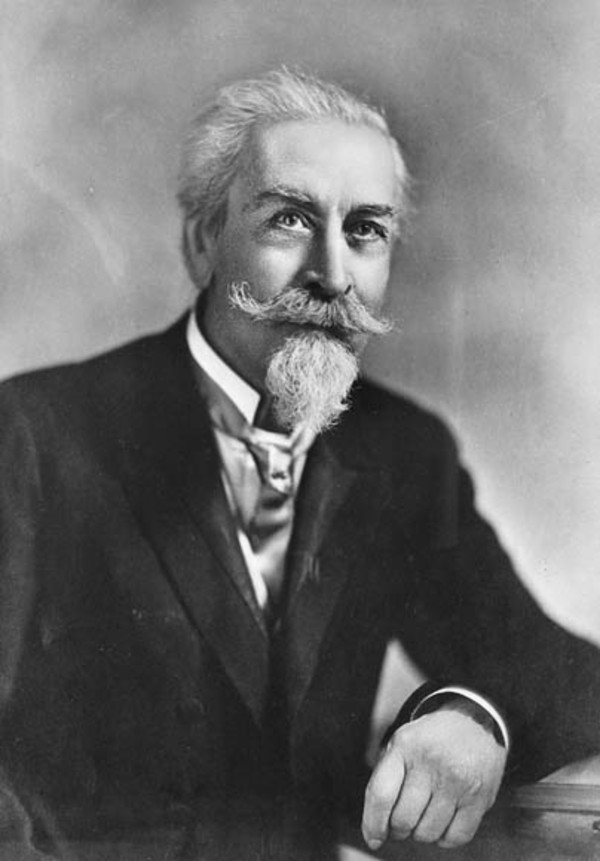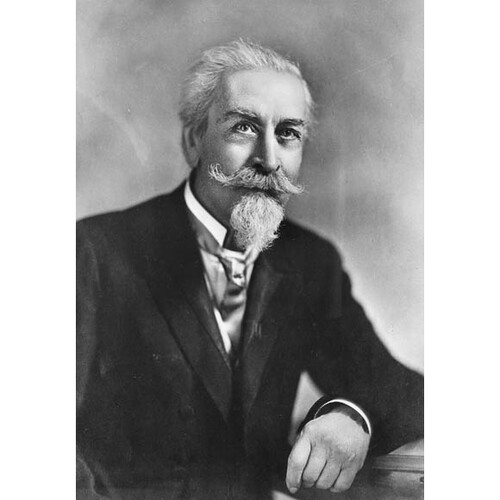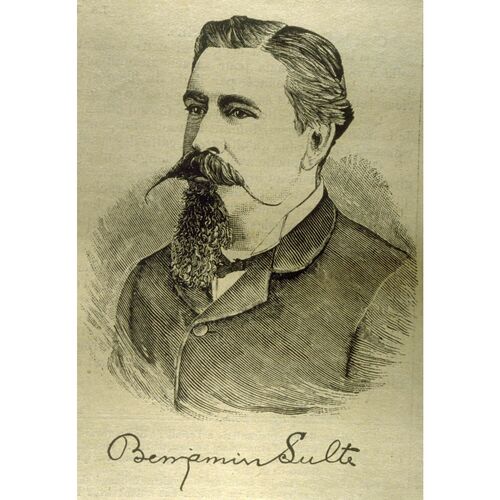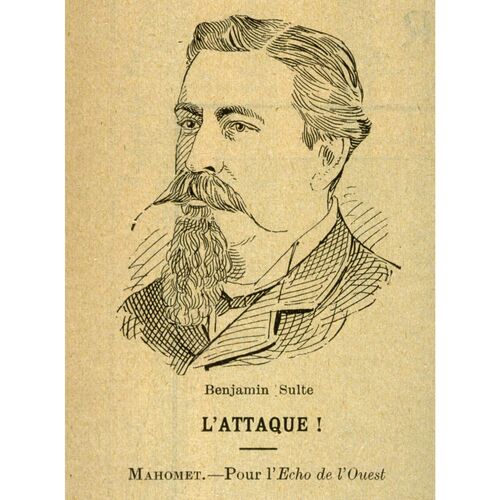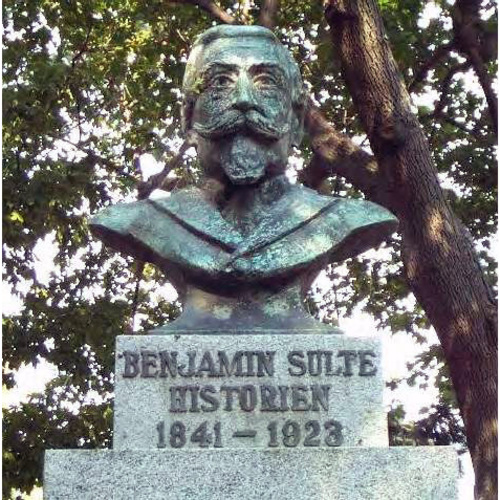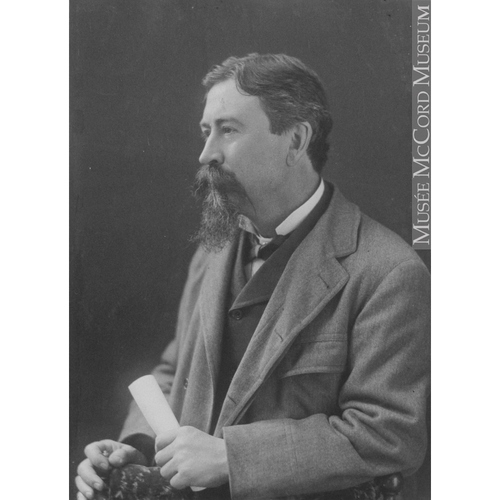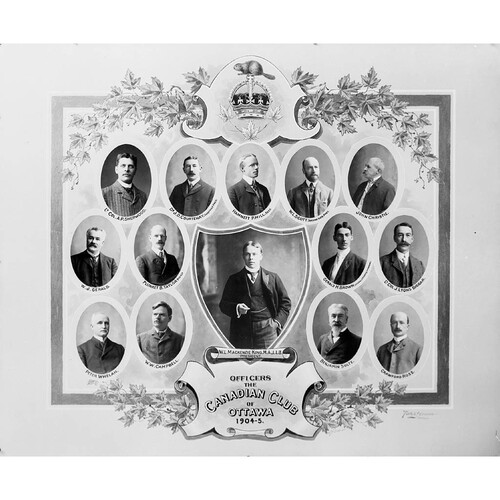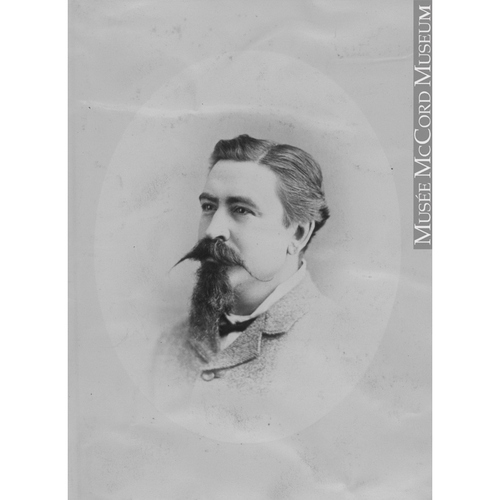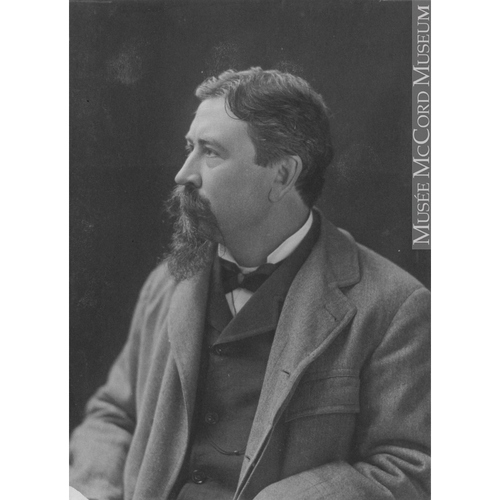SULTE, BENJAMIN (baptized Olivier-Benjamin Vadeboncœur), journalist, writer, office holder, and historian; b. 17 Sept. 1841 in Trois-Rivières, Lower Canada, son of Benjamin Sulte, dit Vadeboncœur, and Marie-Antoinette Lefebvre; m. 3 May 1871 Augustine Parent, daughter of Étienne Parent*, in Ottawa, and they had two children, neither of whom survived; d. 6 Aug. 1923 in Ottawa and was buried on 10 August in Trois-Rivières.
Benjamin Sulte began his studies with the Brothers of the Christian Schools in Trois-Rivières. In October 1847 his father died in a shipwreck near the coast of the Gaspé peninsula; as a consequence, he had to leave school around the age of 10 to provide for his family. He then engaged in different trades: he was, among other things, a clerk in a dry goods shop, clerk in a grocer’s shop, bookkeeper for lumber merchants G.-A. Gouin et Compagnie, paymaster on a steamship plying between Trois-Rivières and Montreal, and owner of a shop on a Grand Trunk Railway line under construction from Arthabaskaville (Victoriaville) to Doucet’s Landing (Des Ormeaux). A self-taught man, he devoted his free time to reading and study in order to broaden his knowledge. In 1861, at the time of the Trent affair [see Sir Charles Hastings Doyle*], he joined the militia and he became a sergeant-major some time later. He sought admission to the School of Military Instruction of Quebec where he is said to have received his captain’s certificate. After briefly resuming active service during the campaign against the Fenians, in 1866 he replaced Elzéar Gérin* as editor of Le Canada, a Conservative Ottawa newspaper. The following year he was appointed translator in the House of Commons. Then in 1870 Sulte entered the Department of Militia and Defence, where he took charge of correspondence, and in 1889 he became chief clerk. He would hold this office until he retired in 1903.
Sulte came from a modest background. His ancestor Jean Sulte, dit Vadeboncœur, a saddler and shoemaker, is thought to have arrived in Canada with the troops of Louis-Joseph de Montcalm*. His son Joseph, Sulte’s grandfather, was a carter by trade, while Sulte’s father, Benjamin, was a navigator by profession. Sulte’s marriage to Augustine Parent introduced him into a circle of men of letters which included his father-in-law, Étienne Parent, a former journalist and mla, who was under-secretary of state at the time, and his brothers-in-law, Antoine Gérin-Lajoie*, a writer, journalist, and officer holder, and Évariste Gélinas*, a journalist, editor of La Minerve (Montréal) from 1861 to 1865, and then office holder. As the years went by, Sulte also wove close ties with intellectuals such as Alfred Garneau, Joseph-Étienne-Eugène Marmette, William Kirby*, and François-Edme Rameau de Saint-Père. The diverse networks he found and cultivated through his correspondence helped round out his cultural knowledge by furthering the exchange of privileged information. They also enabled circulation of material, including unpublished documents, and fostered dissemination of works and recognition of their authors.
Sulte began to write poems and songs for various newspapers around 1860. At the end of this decade, he began publishing at a frenetic rate: Les Laurentiennes: poésies (Montréal, 1869), Histoire de la ville des Trois-Rivières et de ses environs (Montréal, 1870), Mélanges d’histoire et de littérature ([Ottawa], 1876), Chants nouveaux ([Ottawa], 1880), and so on. His main work, Histoire des Canadiens-français, 1608–1880: origine, histoire, religion, guerres, découvertes, colonisation, coutumes, vie domestique, sociale et politique, développement, avenir, was brought out at Montreal in eight volumes between 1882 and 1884. In it Sulte adopted a point of view different from that of previous writers, taking an interest in the living conditions of ordinary people, an approach well conveyed by the title of the work. Influenced by the realist movement, he examined his sources with a critical eye and did not embrace the received opinion of his predecessors, who exalted the role of religious communities under the French regime. His account provoked many an argument, precisely because of the unflattering portrait he gave of both the Jesuits and Quebec’s first bishop, François de Laval*. Sulte thus acquired the reputation of being a historian with liberal ideas. He was also reproached for sliding at times into inappropriate generalizations and for occasionally drawing hasty conclusions. His various works seemed, however, to be better received by anglophones. The quarrels triggered by the publication of Histoire des Canadiens-français did not prevent Sulte from continuing to display his convictions openly. An impetuous man, he did not shrink from polemics; in an article published in 1902 he lashed out at Octave Crémazie*, “the Mohammed of the failed patriots,” and “the little religion of the Vive la France.” His outspokeness ruffled the feelings of several contemporaries who glorified the memory of the national poet. There was a general outcry and Sulte barely escaped being expelled from the Institut Canadien-Français of Ottawa. The historian’s violent outburst aroused old feelings of rancour and, under the pen of his detractors, he became “the insulter of France, the traitor of his race, and the denigrator of our national figures.”
Some distressing events of a private nature cast a shadow over the last years of Sulte’s life. In 1912 he separated from his wife. Afterward he lived with his sister Émilie, who joined him in Ottawa. Their life together was not without rough patches and at the end of 1920 he had to move into a room at the Albion Hotel. Loneliness and ill health wore him down. In February 1922 he was taken in by his nephew, Paul-E. Parent, with whom he would stay until his death.
Heavily involved in literary circles, Benjamin Sulte was a member of, notably, the Institut Canadien-Français of Ottawa, the Cercle des Dix in that city, the Société Historique de Montréal, and the Royal Society of Canada. In 1916 the University of Toronto awarded him an honorary lld. Sulte delivered hundreds of lectures and, according to his contemporaries, was a gifted speaker. The man who had been dubbed the “great stirrer up of history” is remembered as indefatigable and scholarly, a tireless researcher who amassed and compiled notes. He was undoubtedly the most prolific writer of his time, having authored countless articles during his life – more than 3,500 by his own estimate in 1916. His friends recognized his prodigious creativity and celebrated the appearance of Sulte’s 100th article, published in the December 1886 number of the Revue canadienne (Montréal), with a literary and historical banquet; the prolific writer in fact wrote all the texts appearing in this issue. Gérard Malchelosse*, who is considered his disciple, collected many of Sulte’s articles and published them in Montreal in Mélanges littéraires (2 volumes) and Mélanges historiques (21 volumes) between 1918 and 1934.
AO, F 1076, MU 1634. Arch. de l’Univ. de Montréal, P57/58 (fonds Jean Bruchési). Arch. de l’Univ. Laval (Québec), P121 (fonds Gérard-Malchelosse). Arch. du Séminaire de Nicolet, Qué., F045 (fonds Elzéar-Bellemare). Arch. du Séminaire de Trois-Rivières, Qué., 0129-C2 (fonds Marguerite-Marie). Gérard Malchelosse, “Benjamin Sulte et les débuts du journalisme aux Trois-Rivières,” Le Nouvelliste (Trois-Rivières), 21 juin 1941. “Un autre aspect de la vie de notre historien, B. Sulte,” Le Nouvelliste, 17 sept. 1941. F.-J. Audet, “Benjamin Sulte,” BRH, 32 (1926): 337–47. Cinquante-six ans de vie littéraire: Benjamin Sulte et son œuvre; essai de bibliographie des travaux historiques et littéraires (1860–1916) de ce polygraphe canadien . . . , Gérard Malchelosse, édit. (Montréal, 1916). Ægidius Fauteux, “Benjamin Sulte,” RSC, Trans., 3rd ser., 18 (1924), proc.: iv–vii. Patrice Groulx, “Benjamin Sulte, père de la commémoration,” CHA, Journal, new ser., 12 (2001: 49–72). Hamel et al., DALFAN, 1257–59. Hélène Marcotte, Benjamin Sulte: cet inlassable semeur d’écrits (Montréal, 2001). [H. J. Morgan], The writings of Benjamin Sulte (Milwaukee, Wis., 1898). “Le premier centenaire de ‘La Revue canadienne,’” Nouvelles Soirées canadiennes (Montréal), 6 (1887): 544–62. Albert Tessier, “Dans l’intimité de Benjamin Sulte,” Cahiers des Dix, 21 (1956): 159–77.
Cite This Article
Hélène Marcotte, “SULTE, BENJAMIN (baptized Olivier-Benjamin Vadeboncœur),” in Dictionary of Canadian Biography, vol. 15, University of Toronto/Université Laval, 2003–, accessed December 29, 2025, https://www.biographi.ca/en/bio/sulte_benjamin_15E.html.
The citation above shows the format for footnotes and endnotes according to the Chicago manual of style (16th edition). Information to be used in other citation formats:
| Permalink: | https://www.biographi.ca/en/bio/sulte_benjamin_15E.html |
| Author of Article: | Hélène Marcotte |
| Title of Article: | SULTE, BENJAMIN (baptized Olivier-Benjamin Vadeboncœur) |
| Publication Name: | Dictionary of Canadian Biography, vol. 15 |
| Publisher: | University of Toronto/Université Laval |
| Year of publication: | 2005 |
| Year of revision: | 2005 |
| Access Date: | December 29, 2025 |


